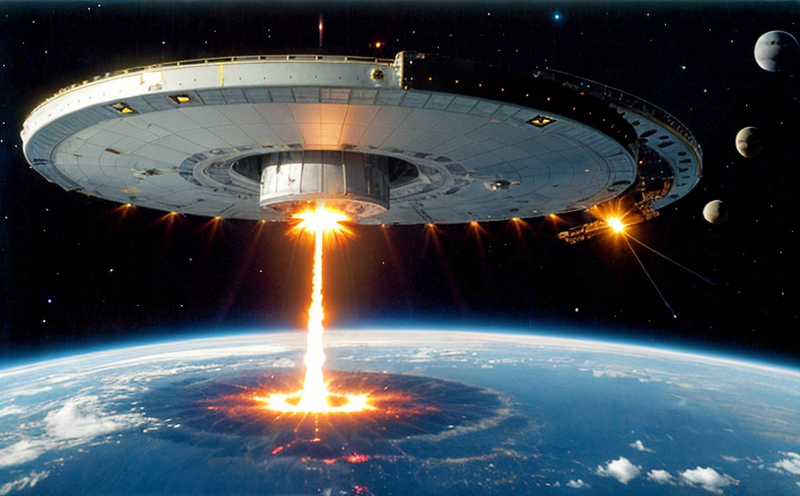ASTM F1232 Proton Irradiation Testing of Space Solar Cells
The ASTM F1232 standard is a critical benchmark in validating the robustness and reliability of space solar cells under proton radiation. This testing is essential for ensuring that photovoltaic devices function effectively in the harsh environment of space, where they are exposed to high-energy particles from cosmic rays. The standard defines the methodology for simulating the effects of protons on silicon-based solar cells through irradiation techniques.
The process involves subjecting the solar cells to a controlled proton flux that mimics the natural exposure conditions in orbit. This helps researchers and engineers understand how these devices will perform over their expected operational lifetime, which can span decades in space applications. By adhering strictly to ASTM F1232, laboratories ensure compliance with international standards that are recognized globally by industry stakeholders.
The testing procedure typically begins with careful preparation of the solar cell samples according to specified guidelines outlined in the standard. This includes cleaning procedures and ensuring all variables—such as temperature, humidity, and atmospheric pressure—are controlled during irradiation. The proton beam is then directed at the sample, providing precise control over dose rates and fluence levels.
Following exposure, detailed characterization of the solar cells is conducted using various analytical techniques to assess changes in efficiency, structural integrity, and electrical properties. These analyses are crucial for determining whether the irradiation has had a detrimental effect on the performance or stability of the device. Results from these tests provide critical data used by manufacturers and designers to optimize future iterations of space-grade photovoltaics.
Compliance with ASTM F1232 not only ensures high-quality products but also facilitates interoperability among different components within complex satellite systems. This standardization supports broader goals like reducing costs associated with rework or replacement parts, enhancing overall mission success rates, and promoting long-term sustainability in space exploration efforts.
Moreover, by participating in ASTM F1232 testing, organizations demonstrate their commitment to quality assurance and adherence to rigorous scientific protocols. This builds trust among clients who rely on reliable performance from space solar cells for critical applications ranging from communications satellites to deep-space probes.
In summary, ASTM F1232 proton irradiation testing is an indispensable tool in the development of safe, efficient, and long-lasting photovoltaic systems used in space exploration. It plays a vital role in safeguarding investments made by governments, private companies, and research institutions involved in this exciting field.
Benefits
The primary benefit of ASTM F1232 proton irradiation testing lies in its ability to predict the long-term durability and performance of space solar cells. By simulating real-world conditions, this testing allows manufacturers to identify potential weaknesses early on in the design process, leading to improvements that enhance reliability and extend operational lifetimes.
Another key advantage is enhanced confidence among users who know their products meet stringent international standards like those set forth by ASTM F1232. This ensures interoperability across various space systems, which is particularly important given the collaborative nature of modern space missions.
Furthermore, compliance with such high-quality testing practices helps reduce risk associated with failures in critical components, thereby protecting expensive assets and ensuring mission success. For example, successful tests conducted according to ASTM F1232 can prevent costly delays or cancellations due to unforeseen issues arising during deployment.
Lastly, participating in these rigorous tests provides valuable insights into material behavior under extreme conditions that cannot be easily replicated on Earth. This knowledge is invaluable for advancing technology and improving future designs of space photovoltaic systems.
Industry Applications
The application of ASTM F1232 proton irradiation testing extends beyond just satellite communications; it encompasses a wide range of aerospace applications where high reliability is paramount. For instance, in military satellites used for defense purposes, ensuring the integrity of solar cells against radiation damage is crucial for maintaining secure communication links.
In civil space missions focused on scientific research, such as planetary probes or orbiters designed to study distant planets, reliable power generation from photovoltaic arrays ensures continuous operation regardless of changes in orbital position. Similarly, Earth observation satellites rely heavily on solar cells for transmitting valuable data back to ground stations.
For commercial satellite operators, compliance with ASTM F1232 helps maintain competitive edge by delivering products that meet or exceed industry expectations regarding performance and reliability. Ultimately, successful completion of these tests enhances brand reputation while fostering customer trust—a vital factor in securing contracts for future projects.
Competitive Advantage and Market Impact
Organizations that invest in ASTM F1232 compliant testing enjoy several competitive advantages. One significant benefit is reduced risk associated with potential failures during mission operations, which can lead to costly repairs or replacements of malfunctioning components.
Moreover, adherence to this standard demonstrates a commitment to quality and reliability, which appeals strongly to both government agencies and private sector clients who prioritize safety and performance in their space initiatives. This reputation translates into increased market share as potential partners look for reliable suppliers capable of delivering high-quality products.
The ability to provide detailed reports on the results of ASTM F1232 testing also gives companies an edge over competitors by offering transparent insights into how their products perform under simulated space conditions. Such transparency fosters trust among stakeholders, making it easier to win contracts and secure funding for ongoing projects.
In addition, participation in this rigorous testing process helps organizations stay ahead of regulatory changes and technological advancements in the field of space photovoltaics. By continuously improving their methodologies based on new findings from these tests, companies position themselves as leaders within the industry.
Ultimately, investing in ASTM F1232 proton irradiation testing positions an organization as a leader in delivering reliable, high-performance photovoltaic systems suitable for demanding space environments. This strategic move not only enhances current operations but also prepares them for future challenges and opportunities in this rapidly evolving sector.





